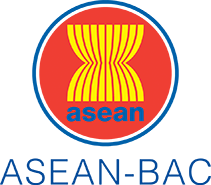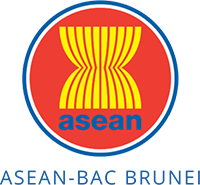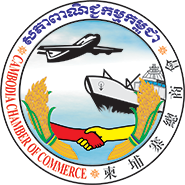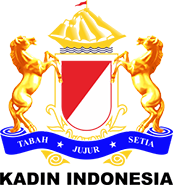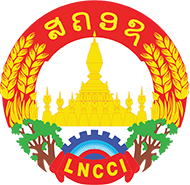summary
March 4th 2022
9th Webinar: Japan’s New Initiatives AJIF and AETI - For starting new economic relationship between Asia and Japan -
(Archived Video: click here)
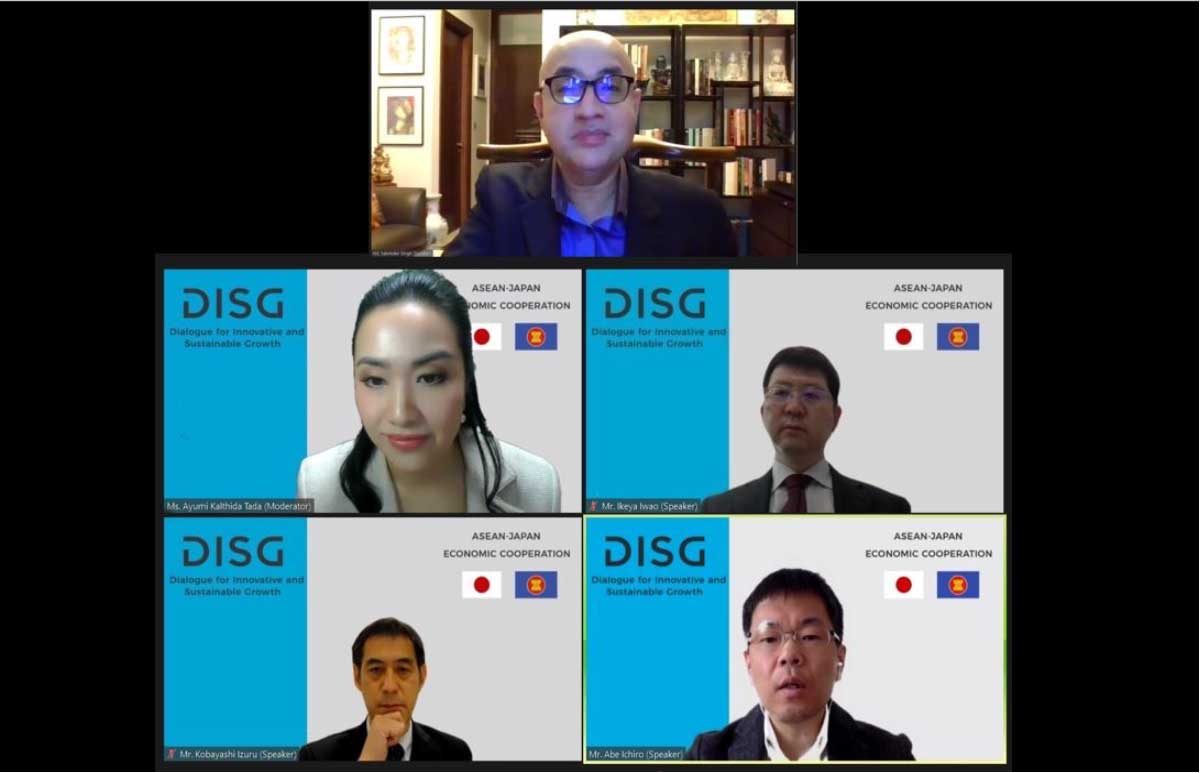
Agenda
1. Opening Remarks from the ASEAN Economic Community
2. Presentation 1: Asia-Japan Investing for the Future Initiative (AJIF) from METI, Japan
3. Presentation 2: Overview of Program for Strengthening Overseas Supply Chains and Feasibility Study Project for Overseas Deployment of High-Quality Infrastructure from METI, Japan
4. Presentation 3: Japan’s support for Energy Transitions in Asia from METI, Japan
5. Q&A Session
Speaker
-
H.E. Satvinder Singh
Deputy Secretary-General of ASEAN for ASEAN Economic Community -
Mr. Ikeya Iwao
Director for Asia and Pacific Division, Trade Policy Bureau, METI, Japan -
Mr. Abe Ichiro
Director for Trade Promotion Division, Trade and Economic Cooperation Bureau, METI, Japan -
Mr. Kobayashi Izuru
Deputy Commissioner for International Affairs, Agency for Natural Resources and Energy (ANRE), METI, Japan
Moderator
-
Ms. Ayumi Kalthida Tada
Director of Public Relations, AMEICC Secretariat
Webinar Summary
(Opening Remarks)
H.E. Satvinder Singh, Deputy Secretary-General of ASEAN for ASEAN Economic Community shared ASEAN’s expectations for stronger ASEAN-Japan cooperation, especially on digitalization and sustainability. ASEAN welcomes the Asia-Japan Investing for the Future Initiative (AJIF) that aims to enhance ASEAN’s competitiveness, and resonates with ASEAN’s sustainable growth agenda. AJIF amplifies Japan’s support for sustainable growth and carbon neutrality initiatives in ASEAN, which includes the Asia Energy Transition Initiative (AETI). ASEAN strives to implement a balanced mix of policies for recovery, and is consolidating efforts on digitalization and sustainability. In this context, ASEAN and Japan should work on three areas, namely, (i) a stronger partnership for digital economy, in the context of the Bandar Seri Begawan Roadmap and the Consolidated Strategy for the Fourth Industrial Revolution for ASEAN; (ii) partnership for innovation and sustainability, particularly on sustainable technologies and financing for green industries, in line with the Framework for Circular Economy for the AEC; and (iii) deeper collaboration with Japanese private sector to help ASEAN build a professional workforce of the future to support ASEAN’s digital transformation and sustainable development. ASEAN-Japan partnership is key to achieving innovation and sustainable development in the region. With Japan’s support, ASEAN can achieve successful ASEAN economic integration, and in return foster mutual interests of growth in the region.
(Presentation 1: Asia-Japan Investing for the Future Initiative (AJIF))
Mr. Ikeya Iwao, Director for Asia and Pacific Division, Trade Policy Bureau, METI, Japan explained the overview of the AJIF which defines the new cooperative relation between ASEAN and Japan in the economic area with keywords of “innovation”, “sustainability”, and “co-creation” and presented the principles of AJIF. He gave examples of ongoing projects being undertaken by Japanese companies. He explained more about the five cooperation areas that would be strengthened by Japan namely 1)supply chain, 2)connectivity, 3)digital innovation, 4)human resources, and 5)green industries. He introduced the Japanese government’s support related to supply chain resilience, innovation, and energy transition. He also introduced the Asia Digital Transformation (ADX) projects in cooperation with ASEAN and Japanese companies by using innovative technologies aiming at solving socio-economic challenges in the ASEAN region.
(Presentation 2: Overview of Program for Strengthening Overseas Supply Chains and Feasibility Study Project for Overseas Deployment of High-Quality Infrastructure)
Mr. Abe Ichiro, Director of Trade Promotion Division, Trade and Economic Cooperation Bureau, METI, Japan introduced two programs under AJIF. On the first program, he presented Program for Strengthening Overseas Supply Chains, ongoing subsidy program for capital investment by Japanese companies in the ASEAN region. He introduced that the fifth public invitation has been starting from January until the end of March with expectation for many applicants to this program. Then, he continued to explain the second program, the Feasibility Study Project for Overseas Deployment of High-quality Infrastructure, which METI provided support to private companies for feasibility study on infrastructure projects in overseas, contributing to the sustainable growth of ASEAN countries. He further highlighted the two pillars under the second program that covered both upstream and downstream of infrastructure development.
(Presentation 3: Japan’s Support for Energy Transitions in Asia)
Mr. Kobayashi Izuru, Deputy Commissioner for International Affairs, Agency for Natural Resources and Energy (ANRE), METI, Japan identified the possible challenges for ASEAN over the early retirement of coal fired power plants and introducing renewable energy, especially solar and wind in order to reduce GHG emissions. Then, he gave the explanation on the Asia Energy Transition Initiative (AETI) as a concrete support program by Japan to realize a realistic energy transition in Asia such as formulation of the energy transition roadmaps and USD10 billion financial support to various projects, etc. He also highlighted the Asia Growth Partnership Ministerial Meeting (AGGPM) and the COP26 which were held last year that reiterated Japan’s long-term goal of carbon neutrality by 2050 and Japan’s wide range of assistances to Asian countries, based on AETI. He also presented the recent visit of H.E. Hagiuda Koichi, Minister of METI, Japan, to Indonesia, Singapore, and Thailand, where the Memorandum of Cooperation (MOC) were signed by respective energy ministers to promote cooperation based on AETI. For future events related to AETI, he introduced the AGGPM Public-Private Forum to be held on 25th April 2022, and the 2nd AGGPM that be also convened on the 26th September this year.
Opening Remarks
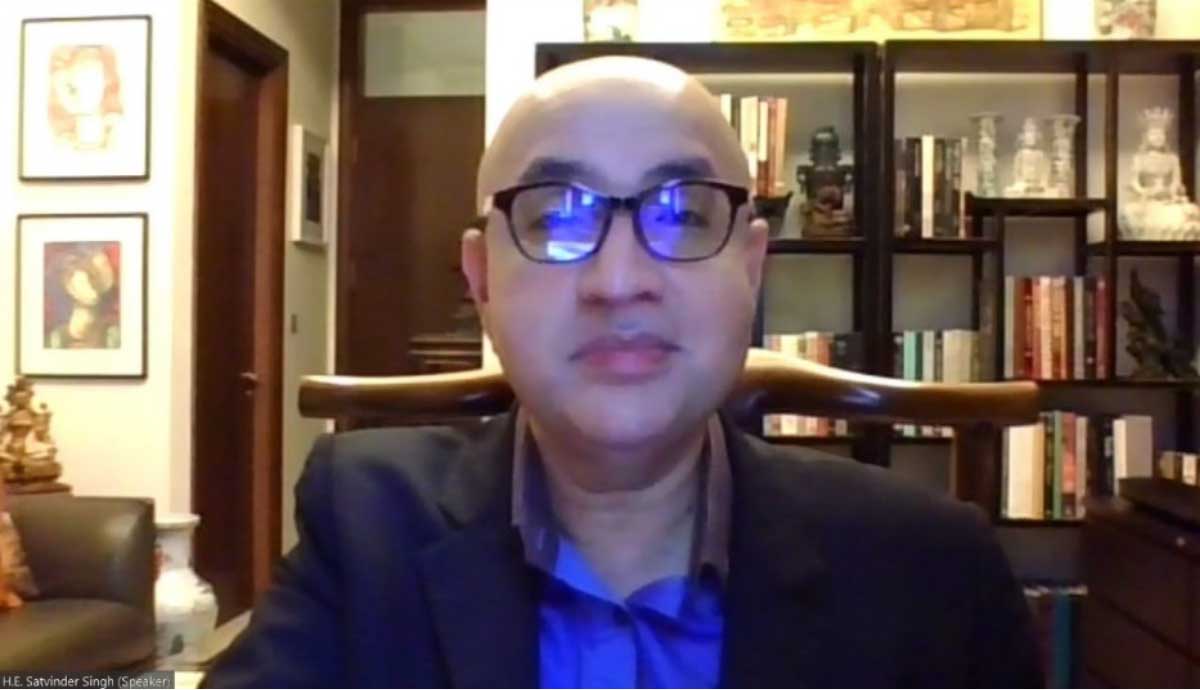
H.E. Satvinder Singh, Deputy Secretary-General of ASEAN for ASEAN Economic Community provided ASEAN’s expectations for stronger ASEAN-Japan cooperation, especially on digitalization and sustainability.
ASEAN welcomes the Asia-Japan Investing for the Future Initiative (AJIF) that aims to enhance ASEAN’s competitiveness by improving the region’s supply chains capacities, through sharing of innovative solutions in digital, sustainability, and investment. This resonates well with ASEAN’s sustainable growth agenda, and amplifies Japan’s support for sustainable growth and carbon neutrality initiatives in ASEAN, which includes the Asia Energy Transition Initiative (AETI) that was announced last year. Such initiatives demonstrate the deep relations between ASEAN and Japan, and confirms Japan’s unwavering support for ASEAN regional economic integration and development.
Japan is the fourth largest ASEAN trade partner and investor in the region. However with the pandemic, economic activities between Japan and ASEAN softened. The region wishes for Japanese businesses to revitalize then commit to take advantage of the region’s competitive growth, as we expect ASEAN could achieve up to 4-5 percent GDP growth in 2022. The coming into force of the Regional Comprehensive Economic Partnership (RCEP) is another potential booster that also encourage more Japanese conglomerates and innovators to come and establish in ASEAN.
ASEAN also strives to implement a balanced mix of policies for recovery, ensuring to sustain momentum while building back better, and consolidating our efforts especially on digitalization and sustainability. These are the two key areas where we very much welcome Japan’s support. In this context, in order to achieve stronger ASEAN-Japan cooperation, I would like to suggest that ASEAN and Japan work on three areas in particular.
First, a stronger partnership for digital economy. The strengthening of digital partnership could even lead to a study proposing a Digital Agreement with the region. There are already discussions on connecting Japanese trade facilitation customs to the ASEAN Single Window digital platform on which all 10 ASEAN members are already connected. Digitalization and the wider Fourth 4IR initiatives have also become priority for ASEAN. Through digital transformation, the region is focusing its efforts to set up the foundations for a competitive, inclusive, and sustainable Digital ASEAN Community, leveraging on 4IR technologies.
The second area for cooperation is a partnership for innovation and sustainable future, including the use of sustainable technologies and redirecting of public and private funding. Similar to Japan, ASEAN has developed various policy frameworks and initiatives on sustainability, and all ASEAN Member States have committed to reducing carbon emissions under the Paris Agreement for climate change. The different levels of development across the region made ASEAN develop the Framework for Circular Economy for the ASEAN Economic Community to provide a strategic pathway for the transition towards a low carbon circular economy. In 2022, ASEAN Secretariat is coming up with the implementation plan for the Circular Economy Framework, and also working on an ASEAN Carbon Neutrality plan, signaling possible collaborations between ASEAN and the government of Japan and its private sector.
The third area of focus is a possible clear path for future collaboration, especially one that brings mutual benefits to both ASEAN and Japan. We suggest Japan private sector partnerships in helping ASEAN build a professional workforce of the future, such as emulating digital reskilling initiatives in Japan in order to reskill the ASEAN white-collar workforce, and collaboration with the Japanese business community to invest in internship programmes to allow ASEAN professionals, including university students, to train or intern in Japanese companies in ASEAN.
ASEAN-Japan partnership is key for the region achieving its goal of innovative and sustainable development. ASEAN can learn from the experiences of Japan on the implementation of sustainability measures, as well as the adoption of innovative technologies. Only with your support can we realize our goals for successful ASEAN economic integration which in return will support Japan’s interests in our region.
Presentation 1: Asia-Japan Investing for the Future Initiative (AJIF)
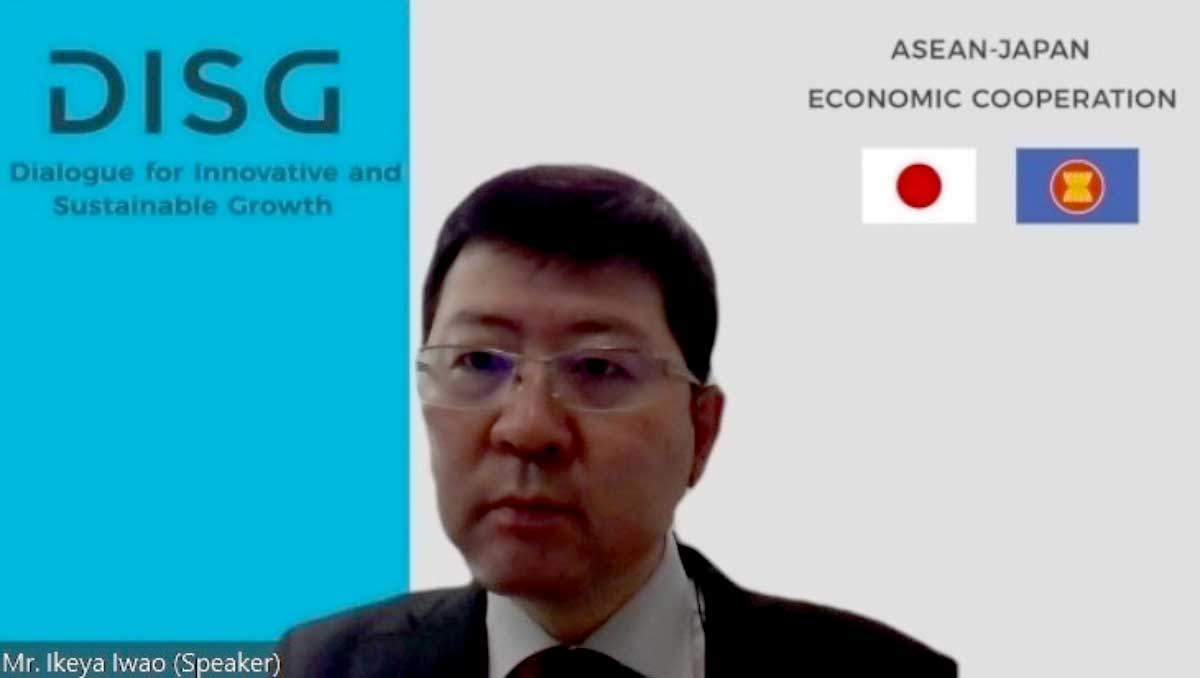
Mr. Ikeya Iwao, Director for Asia and Pacific Division, Trade Policy Bureau, METI, Japan explained the overview of the Asia-Japan Investing for the Future Initiative (AJIF) which defines the new cooperative relation between ASEAN and Japan in the economic area with key words of “innovation”, “sustainability”, and “co-creation”, by looking into the future of Asia and Asia Pacific. This initiative was announced by H.E. Hagiuda Koichi, Minister of METI, Japan during his visit to Southeast Asia this January. Having reviewed the development of ASEAN-Japan economic relationship, it was initially led by Japanese auto manufacturers mainly in Thailand, followed by a large number of other Japanese companies who expanded their production based across the ASEAN region with currently more than 14,000 Japanese companies are operating in the ASEAN region. ASEAN and Japan worked intensively in both hard and soft connectivity including the rulemaking in trade and investment, particularly the RCEP Agreement which entered into force on 1 January this year. Unquestionably, the economic relationship has now changed significantly.
Aforementioned three key words were emphasized in this context. Noting the expansion of middle class and digital youths in the ASEAN region, innovation has become more significant with a greater number of regional business players as innovators and outstanding performance of digital tech start-ups. Many greatest challenges which Asia is now facing were also highlighted in relation to climate change, poverty reduction, job securing, healthcare access, urban transport infrastructure, and agricultural productivity which Japan has its strong will, contributing to solve such challenges by promoting sustainability. In addition to the current relationship, the new relationship between ASEAN and Japan is already taking shape by becoming co-creating partners on innovation, especially in the form of private businesses. Specifically, for Japanese companies, ASEAN is now a partner to innovate and launch business together. Japan in this regard would like to actively promote future investment and co-creation of innovation with ASEAN. Through the AJIF, it is thus hopeful to further deepen the economic relationship between ASEAN and Japan.
The principles of AJIF were underlined that are (i) to offer effective solutions to the reality faced by ASEAN countries; (ii) to create foundation for sustainable economic society by using private sector’s innovation to the maximum extent such as encouraging the support for innovative business projects; and (iii) to “co-create” the region’s future through collaboration between ASEAN and Japanese companies. The three ideal images of the future’s ASEAN-Japan co-creation included (i) improving attractiveness as a global supply chain hub; (ii) creating innovation that enhances sustainability and contributes to solving regional social issues and (iii) promoting energy transition. In this respect, the private sector would be a significant driving force for innovation and sustainability. Examples of ongoing projects being undertaken by Japanese companies were demonstrated such as (i) a project utilizing IoT by part manufacturer to develop human resources for lean and efficient production; (ii) a project using data by electronics manufacturer to optimize their entire supply chain management across companies; (iii) a project using data by trading company to provide enhanced medical services through patient centered services; (iv) a project by start-up company to develop carbon-free raw materials and start a mass-production plant in ASEAN; (v) a project by engineering company to conduct feasibility study for building hydrogen supply chain; and (vi) a project by heavy industry company to develop technology to co-fire and ammonia.
In order to realize the three ideal images, the five cooperation areas would be strengthened by Japan namely supply chain, connectivity, digital innovation, human resources, and green industries. Under the Japanese government’s support, the ongoing projects related to supply chain resilience, innovation and energy transition were further introduced. To build resilient and competitive supply chain, the promotion of data utilization is the key. In this regard, the government of Japan (METI) has already secured the budget of USD9 million to promote the enhancement of supply chains by establishing 100 good practices of supply chain management with ASEAN and Asian countries in the next five years. In addition, the opportunities would be provided for ambitious 50,000 highly skilled Asian professionals to seek jobs in Japanese companies in Asia as well as in Japan over the next five years. In this regard, METI would cooperate with other government agencies, including the Ministry of Education, Culture, Sports, Science and Technology (MEXT, Japan) and JETRO to encourage more opportunities for students and workers in Asia to work in Japanese companies in Asia through various approaches. Under the AJIF concept in co-creating Asia’s growth, it is therefore of importance for Asian talented human resources to perform at their best whilst Japanese companies could grow together with them.
Furthermore, the Asia Digital Transformation (ADX) projects by METI were also presented in cooperation with ASEAN companies/institutions by using innovative technologies aiming to solve socio-economic challenges in the AMS. To date, 40 outstanding projects have been chosen in 10 AMS, in various fields including healthcare, agriculture, and fisheries etc., with the estimated budget of USD8 million in total. The new budget of USD7.7 million has also been secured for new projects aiming at promoting collaboration between ASEAN and Japanese companies for digital innovation in the future. Under AJIF, the new application for new innovative projects would also be called around May 2022, which offers new opportunities for ASEAN companies to partner with Japanese companies to apply. Another update which was highlighted is the Japan’s public private fund so-called “Japan Investment Corporation (JIC)” has announced on 31 January this year that it would invest USD55 million to push forward the co-creation between ASEAN and Japan companies through collaborative projects.
Presentation 2: Overview of Program for Strengthening Overseas Supply and Feasibility Study Project for Overseas Deployment of High-Quality Infrastructure
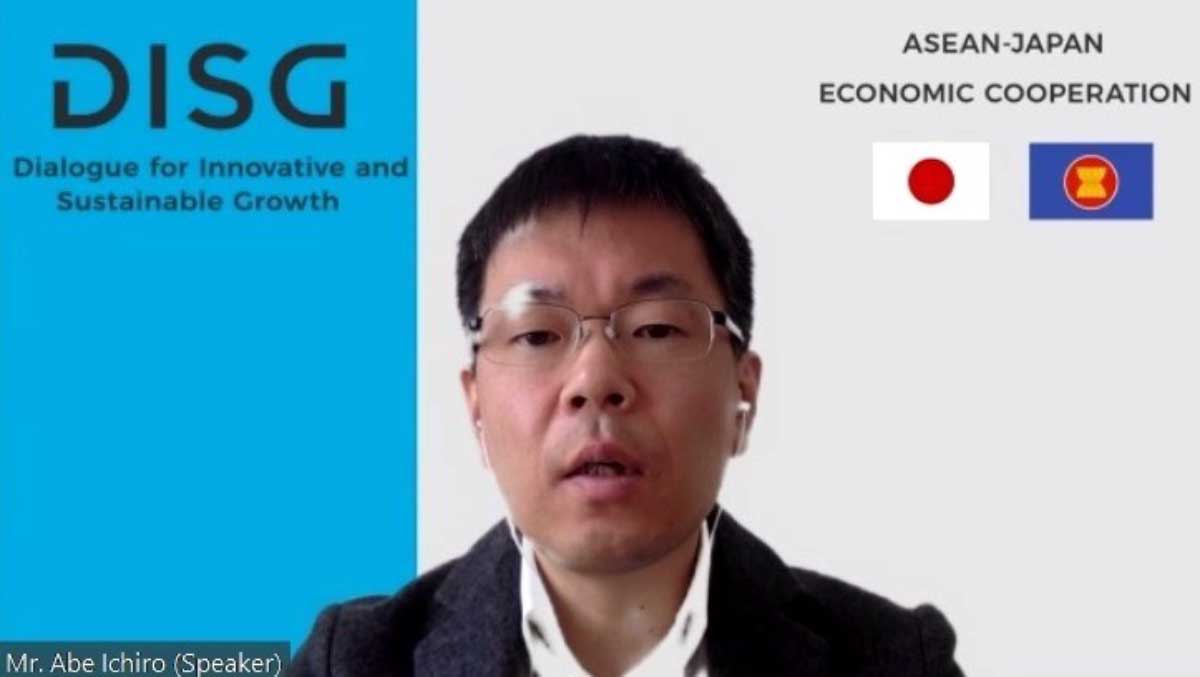
Mr. Abe Ichiro, Director for Trade Promotion Division, Trade and Economic Cooperation Bureau, METI, Japan introduced two programs on Strengthening Overseas Supply Chains and Feasibility Study Project for Overseas Deployment of High-Quality Infrastructure, under the support of METI, Japan.
In order to mitigate the disruption risks in supply chain, it is important for Japan not to rely too much on one particular production base and but rather diversify to other production bases. From the Japan’s perspective, this meant to strengthen Japan’s procurement system and industrial base. From ASEAN countries’ viewpoint, it meant for more FDI to each country and creating enhancement of connectivity to the entire supply chain. This is the win-win situation for both regions.
Focusing on Program for Strengthening Overseas Supply Chains, the ongoing subsidy program for capital investment of Japanese companies in ASEAN, it commenced in 2020 by METI under the budget allocation of JPY35.1 billion (USD223 million) in total. Among 92 projects, there are 90 projects which were adopted in ASEAN region such as in Vietnam as the top destination, followed by Thailand, Indonesia, Malaysia, etc. In terms of sectoral support, this program covered the field of semiconductor-related products (e.g., widely used in a variety of sectors including medical devices, manufacturing devices, smartphones, etc.), automobile-related parts, aircraft-related parts, and healthcare. The target of this subsidy program was mainly the upstream industry sector.
The second program is the Feasibility Study Project for Overseas Deployment of High-Quality Infrastructure. Under this program, METI provided support to private companies for feasibility study on infrastructure projects in overseas, contributing to the sustainable growth of ASEAN countries. There are two pillars under the program coverage; one is concerning the upstream of infrastructure development such as providing commission expenses for the formulation of the master plan; and second is concerning the downstream of infrastructure development such as providing subsidies for conducting the feasibility studies for individual infrastructure projects. In 2021, 38 projects were adopted and about 60% were the projects in ASEAN region. Key examples of the feasibility study projects were shown, namely the feasibility study for gastrointestinal (GI) cancer diagnosis platform in Thailand, conducted by the Japanese company known as FUJIFILM which has the platform contributes to the early detection and medical treatment of GI cancer by introducing AI endoscopy in order to assist doctors and medical groups for effective operation with big data analysis. This platform would also contribute to the enhancement of Thailand’s well-being. Another key example is the feasibility study on ammonia co-firing at coal power stations in Malaysia, conducted by the Japanese company called IHI which would evaluate the co-firing technology and economies across the entire supply chain, owing to the needs of producing, transporting, and properly managing ammonia in the power plants. Through such the project, Japan wished to create the network in Asian countries towards the energy transition. The ideal behind these programs, such as co-creation, co-working, and co-development with Asia countries were also underscored. Through these programs, Japan wished to contribute to sustainable development growth of ASEAN.
Besides, for information, the Subsidy Program for Strengthening Overseas Supply Chains is now open for public invitation. This is the fifth public invitation, starting from January until the end of March 2022. METI, Japan therefore wished to see many applicants to the program.
Presentation 3: Japan’s Support for Energy Transitions in Asia
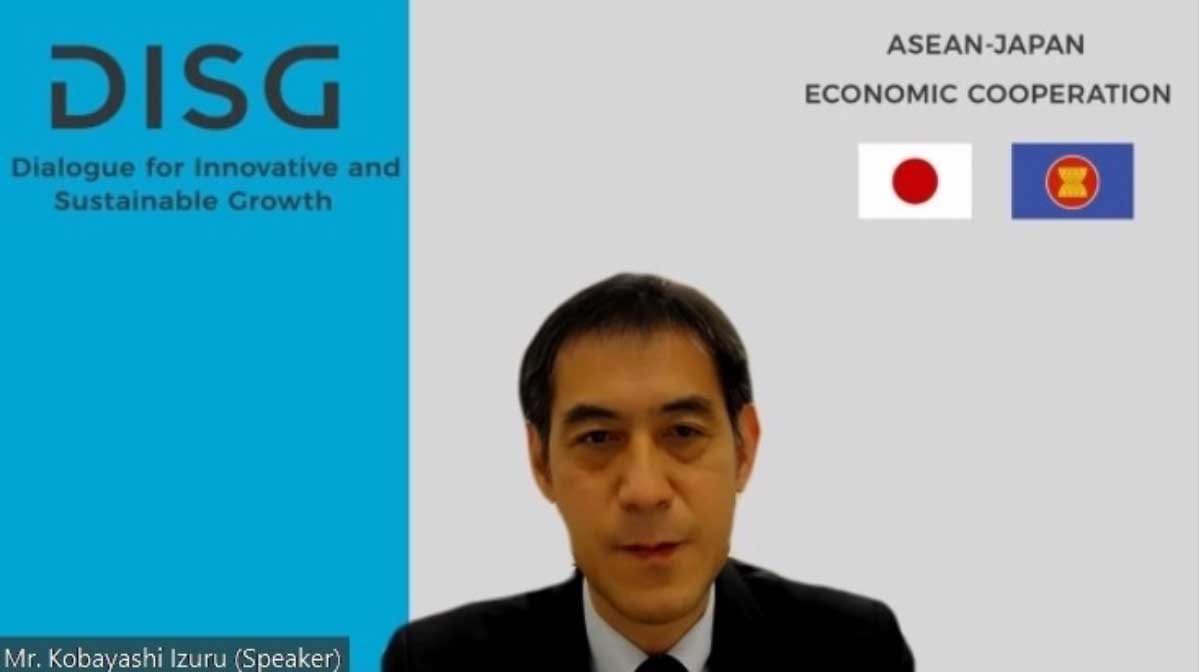
Mr. Kobayashi Izuru, Deputy Commissioner for International Affairs, Agency for Natural Resources and Energy (ANRE), METI, Japan stressed that in the run up to COP26, Asia including those in ASEAN emerging economies announced to aim for carbon neutrality. The target year is varying from country to country such as India in 2070, Indonesia in 2060, Thailand, Vietnam, and Malaysia in 2050 respectively. To reduce GHG emissions, the European countries and the US are promoting policies scenarios, including (i) early retirement of coal fired power plants; and (ii) introducing renewable energy especially solar and wind. However, such scenarios could be very difficult to implement and less effective in Asia Pacific region, especially in ASEAN. Concerning the (i) scenario, there are two main reasons to be elaborated; first, the retirement of coal fired power plants are rather dangerous for ASEAN where electricity demand is rapidly growing, and it could create the imbalance of the electricity supply which can destabilize the grid management. Second, most of coal fired plants in ASEAN are relatively new and would cause a lot of money for their retirement, comparing to the outdated/obsolete coal fired power plants in European countries, the US, and in some other emerging economies like South Africa. Another challenge for ASEAN in (ii) scenario is that solar and wind potentials for commercially viable projects are relatively small comparing to other regions, for instance, the wind power in Vietnam is difficult for commercially viable projects with current technologies. Despite having enough sunshine for solar power generation in ASEAN region, the challenges would concern certain factors such as the insufficient huge lands to produce such large solar farms, less solar powered electricity generation in raining season, and small-scale grid coverage for introducing solar power to provide sufficient backup in rainy days for the case of power outage/blackout etc. Therefore, all countries, including ASEAN need to make utmost efforts to reduce CO2 emissions and introduce renewable energy. It is necessary to take into account that situation in each country is different and one prescription does not always work.
Asia Energy Transition Initiative (AETI) was announced in May 2021 as a concrete support program by Japan to realize realistic energy transition in Asia. At the Special Meeting of ASEAN Ministers on Energy and Minister of Economy, Trade and Industry of Japan held in June last year. At that time, H.E. Kajiyama Hiroshi as Minister of METI, Japan also gave explanation on AETI which was welcomed by ASEAN countries with great expectations for Japan’s future support. Basically, AETI consists of five pillars which are (i) support for developing the roadmap for energy transition; (ii) guideline for Asia transition finance; (iii) USD10 billion funding for renewable energy and energy saving projects such as LNG, CCUS, etc.; (iv) support for technological development and demonstrations by utilizing the results of the Green Innovation Fund; (v) HRD, knowledge sharing and formulating standards for decarbonization technologies.
On 4th October 2021, Asian countries including AMS, the US, Australia, India, and the Middle East countries participated in the Asia Growth Partnership Ministerial Meeting (AGGPM). At the meeting, the ministers and representatives of international organizations pointed out the need to achieve green growth and accelerate realistic energy transition toward global carbon neutrality as well as agreed that there are multiple pathways to carbon neutrality. They also agreed on the importance of promoting innovations and engaging Asian countries to reduce CO2 emissions. In this regard, METI Minister emphasized Japan’s wide range of assistances to Asian countries based on AETI in order to accelerate energy transition in Asia and this statement was broadly welcomed by all countries. The importance of international cooperation for innovation and the need for financial support also was stressed at the meeting. At the COP 26 held in November 2021, Japan’s Prime Minister Kishida Fumio reiterated about Japan’s long-term goal of carbon neutrality by 2050 and Japan’s Nationally Determined Contribution (NDC) which is 46% reduction of GHG emissions in 2030, comparing to 2013 level. In addition to the maximum efforts to reduce domestic emissions, the Prime Minister also expressed his intention to promote zero emissions in Asia as a whole through financial cooperation and technical support to pursue zero emission thermal power generation, consistent with AETI.
The status of AETI was further elaborated. Regarding the development of a roadmap for carbon neutrality, ERIA and Institute of Energy Economics (IEEJ) would support respective countries to develop roadmaps to achieve carbon neutrality. This project would identify pathways with the lowest emission reduction cost by utilizing linear planning simulation model based on certain assumptions. For instance, the result of simulation in Indonesia indicated that thermal power generation should be utilized while pursuing zero emission thermal power by the ammonia and hydrogen co-firing as well as pursuing CCUS in addition to the deployment of renewable energy systems. Similar result was found in Thailand with the hope to use this model while changing some assumptions and having own analysis. As a result, Japan has decided to invite Thai officials from the Ministry of Energy to IEEJ for necessary trainings as well as set up 100 meetings on subsidy programs to support demonstrations of technologies for realistic energy transition such as ammonia co-firing, particularly the feasibility study of ammonia co-firing at coal power plant would be launched soon in Indonesia. With regard to transition finance in Asia, MUFG and other Japanese banks established the study group in which more than 20 banks from Europe, the US, and Asia participated with an interim report to be issued at the AGGPM Public-Private Forum in April 2022 and final report to be issued at the 2nd AGGPM in September 2022 respectively. The report would be utilized to define the project under the aforementioned USD10 billion energy transition programs. Also, the cooperation for renewables, grid management and energy conservation through policy dialogues with Asia countries by exploring deepening communication, identifying cooperation needs and projects would be further promoted.
The projects under AETI’s USD10 billion financial support were also explained. In order to realize realistic energy transition in Asia, it is necessary to introduce renewable energy and promote energy conservation as much as possible. At the same time, it’s likely that thermal power has to be used in Asia not only at the present but in the future. Pursuing the decarbonization of fossil fuel in the future is therefore of importance. If the countries would like to shift from developing coal fired power plant to other less-carbon alternatives like gas/natural gas, this commitment in fact covered all aspects of renewables, energy conservation, energy storage, grid management, decarbonization of fossil fuel by hydrogen or ammonia co-firing, etc. Most importantly, these projects need to be consistent with respective countries’ roadmaps to achieve carbon neutrality at relevant timing.
In January 2022, the cooperation with Asian countries was strengthened during the visit of H.E. Hagiuda Koichi, Minister of METI, Japan to Southeast Asia particularly Indonesia, Singapore, and Thailand where the Memorandum of Cooperation (MOC) were signed with respective energy ministers to promote cooperation based on AETI. Such MOC emphasized the importance of designing realistic energy transitions and all key elements. The future events related to AETI were also introduced including the AGGPM Public-Private Forum to be held on 25th April 2022, followed by the 2nd AGGPM to be convened on 26th September this year. The participation in these events was also encouraged and highly welcomed.
Q&A Session
(Q&A Session: Q1)
What are the priority areas for Japanese investment in Asia?
-
Mr. Ikeya Iwao
There are five key prioritized areas for future investment in Asia namely supply chain, connectivity, digital innovation, human resources, and green industry. Japan has invested a lot in these areas and would like to continue working together on these areas with ASEAN countries.
(Q&A Session: Q2)
May I know if renewable energy will be included in AETI?
-
Mr. Kobayashi Izuru
The renewable energy is under the coverage of AETI. The project needs to be consistent with the carbon neutrality roadmaps of respective countries and in case there is no roadmap, the project has to be consistent with the national plan on how to reduce GHG emissions. As far as these conditions are met, the project could be included in the support of AETI.
(Q&A Session: Q3)
Does new economic need the local wisdom leadership synergy?
-
Mr. Ikeya Iwao
The wisdom of each country is very indispensable for the creation between ASEAN and Japan, especially solving the social issues. This is also consistent with the concept of AJIF. Also, willing to promote specific projects related to digital transformation.
(Q&A Session: Q4)
How can ASEAN companies be involved to AJIF?
-
Mr. Ikeya Iwao
The concept of AJIF is both ASEAN companies and Japanese companies work together towards the co-creation of innovative and sustainable economic society. If you don’t know any Japanese companies, consulting with JETRO could be an effective option to seek good Japanese business partners as JETRO has high experience and worldwide network in each JETRO office. For those companies which already have good Japanese business partners, they are encouraged to apply for various projects such as digital transformation. In this regard, METI, Japan would strongly support such joint projects between ASEAN and Japanese companies.
(Q&A Session: Q5)
How to find the Social Humanity Scholarship Programs as it is of importance to stabilize both STEP and Social Humanity Study Program to apply an innovative, inclusive and sustainability earth?
-
Mr. Ikeya Iwao
I would suggest further consultation with the embassies of Japan in respective countries (in this case of the enquirer is the Embassy of Japan based in Jakarta) and their authorities concerned in charge of scholarship programs/issues to help introduce their programs and other scholarship programs in the private sector.
(Q&A Session: Q6)
When will the sixth sequence public offering of program for strengthening overseas supply chain begin? In the future, how many time do you plan to do public offering of this program?
-
Mr. Abe Ichiro
METI Japan is now working on the fifth round of public invitation with a need to see and consider the number of applications, number of projects to be eligible for subsidies among all applications, and definitely the budget to be consumed. Through this process, if the budget is sufficient, METI, Japan would consider whether to go for the sixth round of public invitation to be open for prospective applications.



